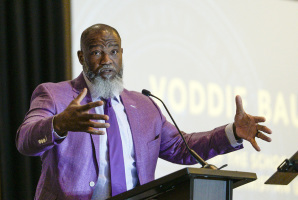E Pluribus Unum
True Diversity
Since 1782, the Latin phrase E pluribus unum—"out of many, one"—has appeared on the Great Seal of the United States.
But what happens when we neglect and even deny the importance of the "one"—that is, cultural unity—and emphasize the importance of the "many"—that is, individuals—which, today, we call "diversity"? As a renowned social scientist learned, nothing good.
In his famous essay "Bowling Alone," published some years ago, Robert Putnam documented our increased tendency to "go it alone," instead of the civic participation that marked earlier eras. This decrease in "social capital," Putnam argued, adversely affected American democracy.
Putnam's latest project put contemporary ideas about "diversity" to the test and found them wanting. The data compiled from 30,000 interviews led him to conclude that "virtually all measures of civic health are lower in more diverse settings."
The more diverse a community is, "the fewer people vote and the less they volunteer, the less they give to charity and work on community projects." They "expect the worst from their community and its leaders." In these communities, people don't withdraw into ethnic and religious subgroups; they "withdraw even from [their] close friends" and "distrust their neighbors, regardless of the color of their skin."
Instead of being engaged, they "huddle unhappily in front of the television," what Putnam calls "hunkering down," much like a turtle inside its shell.
Putnam's findings stunned many observers: One political scientist said that "the extent of the effect is shocking."
It is only "shocking" if you have made "diversity" into an ideological goal. Otherwise, it makes perfect sense that constantly engaging in politically correct diversity programs would make it harder for people to trust one another. Likewise, denying universal norms can't help but promote individualism—destroying culture.
Of course, diversity has been and always will be a fact of life in America, a nation built of immigrants. Just as there are social costs associated with diversity, however, there are also benefits: dynamism and creativity, to name but two.
The question is how do we reap the benefits of diversity while avoiding the costs Putnam describes? The model Putnam offers should surprise no one, but doubtless will: Christian churches.
Putnam wrote that "in many large evangelical congregations . . . the participants constituted the largest thoroughly integrated gatherings we have ever witnessed." Putnam observed that "for part of the week, there is some identity that is more important to them than their ethnic identity . . ." In these churches, people are not "hunkered down" but are "quite comfortable around each other."
Of course, that's because underlying all the racial and ethnic diversity is their essential unity in Christ. This is why Christians can acknowledge and even celebrate the diversity within their churches without fear of "hunkering down"—the person sitting next to you may be different from you in many ways, but he is the same where it counts.
Our politically correct postmodern notions of "diversity" can't offer that assurance, since they deny things like universal truth. So when your neighbors are concerned about a problem like this, tell them where they can come to find the right balance: Join you in church.
_________________________________________________
From BreakPoint®, August 23, 2007, Copyright 2007, Prison Fellowship Ministries. Reprinted with the permission of Prison Fellowship Ministries. All rights reserved. May not be reproduced or distributed without the express written permission of Prison Fellowship Ministries. "BreakPoint®" and "Prison Fellowship Ministries®" are registered trademarks of Prison Fellowship




























